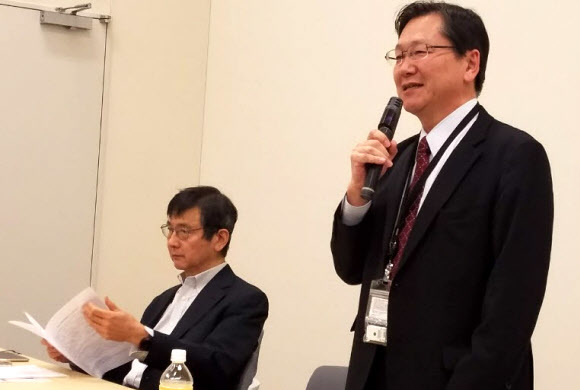 |
|
A group of Japanese attorneys release a statement on Nov. 5 in Tokyo denouncing the attitude of the Abe administration that the harm caused by the forced labor was completely and finally resolved by a 1965 agreement signed by the South Korean and Japanese governments. (Yonhap News)
|
Tokyo plans to submit ICJ complaint if Seoul does not compensate victims for Japanese company
The Japanese government is preparing a “counterattack” to pressure the South Korean government in response to a recent Supreme Court judgment on conscripted workers. The ruling, which concluded that the rights of victims of forced conscription to claim damages were not extinguished with the 1965 Claims Settlement Agreement between the two sides, has drawn vocal objections from Tokyo. The Sankei Shimbun newspaper reported on Nov. 6 that the Japanese government had established firm plans to lodge an International Court of Justice (ICJ) complaint if the South Korean government does not institute legislative measures to compensate the victims on behalf of the Japanese business in question. Consent from the South Korean government would be required for an ICJ trial to take place. According to the newspaper, however, the Japanese government has concluded that simply lodging the complaint would “inform the world how bizarrely South Korea is behaving.” In a press conference the same day, Chief Cabinet Secretary Yoshihide Suga said, “Unless the South Korean government quickly develops appropriate measures, we will develop a response that considers numerous options, including an international trial.” Tokyo was also found to have initiated dispute resolution procedures to lodge a complaint against Seoul with the World Trade Organization, claiming that its application of public funds for Daewoo Shipbuilding and Marine Engineering is in violation of trade rules. “We are aware that the Japanese side had proposed bilateral discussions [in connection with the complaint],” Ministry of Foreign Affairs Deputy Spokesperson Kim Deuk-hwan said in a regular briefing that day. While Japan’s move to lodge a complaint was initiated some months ago, observers are speculating that it could be used as a means of pressuring Seoul in connection with the forced labor ruling. The South Korean government has maintained a stance of not rushing into a response to Japan’s offensive. Following the Supreme Court ruling, it issued a statement saying it “respects the judiciary’s judgment,” adding that the Prime Minister would “work with the relevant ministries and private experts to develop a government response plan.” Professor Yang Kee-ho of Sungkonghoe University said the Japanese government is “waging an offensive against the South Korean government in view of the possibility of more and more forced conscription victims filing suit in the wake of the Supreme Court’s decision, leading to a series of provisional attachments against Japanese companies.” “The Japanese government and media are drumming things up excessively,” he said. Yang went on to warn that “public opinion could worsen and South Korea-Japan relations could end up in a more difficult situation if the South Korean government bows to Tokyo’s pressure and compensates the victims itself.” “Rather than rushing into a response, the [South Korean] government needs to carefully devise realistic measures, such as setting up a fund for victims with contributions from Japanese companies involved in forced conscription,” he suggested. The Japanese government’s stance has drawn criticism even back home. On Nov. 5, 93 Japanese attorneys delivered a statement at the House of Councillors building criticizing the arguments from Tokyo. “Japan could end up losing if it goes before the ICJ,” warned attorney Seita Yamamoto, adding that the “recent international trend has been against blocking the rights of victims to receive restitution through trials.” By Cho Ki-weon, Tokyo correspondent, and Park Min-hee, staff reporter Please direct comments or questions to [english@hani.co.kr]






